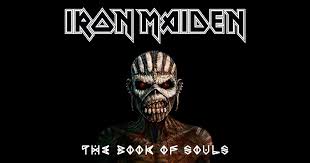The thing that fascinates about Iron Maiden, regardless of where you stand on the quality of their millennial output, is the seemingly endless supply of memorable melodic lines at their disposal. One can make allowance for the fact that these melodies have been indisputably populist , and also how vocalist Bruce Dickinson never swerves drastically or even remotely off course from underlying chord progressions unlike someone like, say, John Arch. One can also say that Iron Maiden have recycled the same patterns and progressions over the last forty years, and that their music is of a predictable nature once initial themes have been established and songs are underway.
And yet, what seems remarkable despite these caveats, or, more accurately, because of them, is just how individual the many songs in Iron Maiden‘s immense catalog sound. One would think that after a career as long as this, a band – especially one relying on a limited configuration of note choices to draw from – would be running out of melodic options, yet this has evidently not happened with Iron Maiden. How can this be?
There is no small element of truth to the grievances that many long time fans have against the band’s recent albums. Iron Maiden are a band of great ideas, though not necessarily great development of those ideas, at least not in the modern era. Once this original impetus runs out, they revert to their rather limited musical template which, in light of the band’s increasingly pronounced tendency to write long songs, results in somewhat ho-hum middle sections. Not always, but often enough to give weight to these complaints.
But the integrity of those original ideas remains beyond reproach. Iron Maiden can still set up a song in great fashion, whatever be their errors in seeing it through to its conclusion. Both observations are on display on The Book Of Souls in great effect; this is a double album that should be heard as such to avoid hearing fatigue. Split up in two halves of forty odd minutes each, this doesn’t seem nearly as bad a prospect as a back to back slog would.
There is something to salvage from both sides. ‘If Eternity Should Fail’ and ‘Tears Of A Clown’ are personal favorites for their refusal of patented galloping tropes, while the overlong ‘The Red And The Black’ is a surprising grower with its arena shouts and the Vangelis-styled lead break in the middle. Elsewhere, ‘Where The River Runs Deep’ and ‘Shadows Of The Valley’ are reminiscent of more exuberant times, while ‘The Book Of Souls’ marks a return to oriental-sounding motifs. The ambitious ‘Empire Of The Clouds’, however, is the definition of bloat and could have used some judicious trimming.
As mentioned above, Iron Maiden have always been a populist band and these songs signal no break from a storied tradition. But this populism should not be equated with the crass commercialism of mainstream culture. Iron Maiden‘s accessibility is not the type that pop music is comfortable with; it offsets the inertia that is the subliminally manifest aim of the former with a virility of thought and emotion that can only be dangerous to the status quo and to the ones selling a lifestyle.
Once you start looking at Maiden in this manner, as a bulwark against the ravaging of old values, their importance in the modern scheme of things becomes palpable. This music still talks and sings about things that have little if any place left in popular discourse, but discourse and curiosity are the only things preventing the mind from slipping into a morbid quiescence. In a time when people are reluctant or incapable of detecting what lies beneath the surface, but are unabashed advocates of gratuitousness and innovation for their own sake, Iron Maiden‘s stubborn endorsement of a time past becomes all the more critical.

